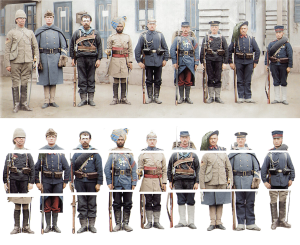8-9 dec 22, international workshop “Colonial violence beyond the borders of empires”

Troops of the Eight-Nation Alliance stand together during the Boxer War in China, 1900 (image adapted after a colourised photo by Julius Jääskeläinen, CC BY 2.0, https://commons.wikimedia.org/w/index.php?curid=91532070)
On 8-9 December 2022, the Centre, in cooperation with the University of Cologne, will hold an international workshop focussing on the topic of Colonial violence beyond the borders of empires: dis/connections, transfers, and mobilities, ca. 1850–1954.
In recent years, historians have increasingly sought to write imperial history beyond the borders of individual, ‘national’ empires. Such transimperial histories have had an impact on several research fields. However, this approach has been far less applied to one crucial aspect of colonial rule: violence. More than a decade ago, Robert Gerwarth and Stephan Malinowski postulated a common ‘Western’ ‘colonial archive’ on violence. We still know little about the exact forms this archive took, who contributed to it, how it might have been formed, and whether it was indeed as exclusively ‘Western’ as Gerwarth and Malinowski assumed. In this workshop, we would like to answer some of these questions and expand the field as a whole.
We strive to do so by addressing different aspects of transimperial connections concerning colonial violence. On a conceptual level, we need considerations on their specific nature, while, on an empirical level, case studies will assist in approaching the different dimensions in which these entanglements manifested themselves on the ground. Finally, contributions will also seek to complicate the notion of connectivity itself. One of our hypotheses is that colonial violence presents a more complex field of connectivity than we might find in other transimperial histories. We aim at analysing points of disconnection, of absences, detours, misunderstandings, distortions, or creative/hybrid appropriations. We are interested in whether and how transimperial histories can change our view of the different theories of nationally specific colonial cultures of violence.
Covering a wide range of empires and European and non-European actors, papers will look among others at specific conflicts, epistemic structures, practices, cooperations, expert exchanges, ideals of masculinity and processes of remembrance that extended colonial violence beyond the borders of individual empires. The workshop will feature keynotes by Bernhard Schär (University of Lausanne) and Kim Wagner (Queen Mary University of London).
Please click HERE to download the programme and HERE for the conference report by Callie Wilkinson.
Place & date: Munich, 8-9 December 2022
Language: English
Host institutions: Käte Hamburger Research Centre global dis:connect, Ludwig Maximilian University Munich; University of Cologne, Cologne
Organisers: Dominique Biehl (University of Basel, Basel), Ulrike Lindner (University of Cologne, Cologne), Tom Menger (Ludwig Maximilian University, Munich), Markus Wurzer (Max Planck Institute for Social Anthropology, Halle/Saale)
Venue: Käte Hamburger Research Centre global dis:connect, Maria-Theresia-Str. 21, 81675 Munich





